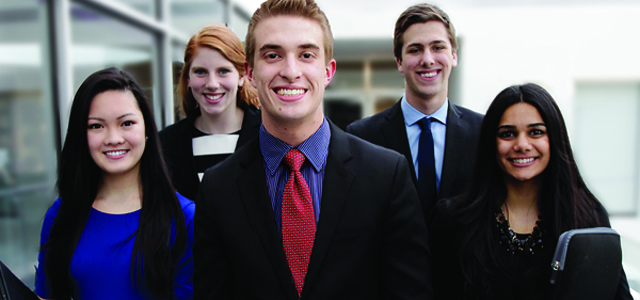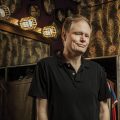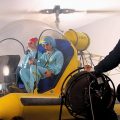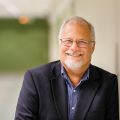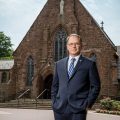That’s the belief at Seton Hall. And the success of the Leadership Development Program at the Stillman School of Business shows how promising students transform into young professionals equally at home in the classroom and the boardroom.
Zachary Blackwood stood inside Investors Bank’s executive suite, facing the company’s chief executive officer, senior vice president and several directors. Dressed in a full suit, dark shoes glistening, he tried to quiet his nerves. It wasn’t easy, since he had an intimidating mission: tell these high-level executives how to improve their company.
Blackwood and his colleagues had been preparing for almost two months. They’d gathered data on how the bank’s branches looked, the customer service each provided and the online experience Investors offered. That day in February, they laid out their findings and recommendations in the Investors Bank boardroom.
About a week later, Blackwood received a phone call: Would you like to come intern for us?
Though he’d just been offering recommendations to the bank’s most senior executives, Blackwood wasn’t an employee or consultant. He is a student in the Stillman School of Business’ Leadership Development Program, and at the time of that big presentation — which he gave with four of his classmates — he was only midway through his freshman year at Seton Hall.

Incredible, perhaps, but nothing unusual in the Leadership Program, which catapults undergraduate students into remarkable situations on a daily basis. One week they’ll be presenting their suggestions to senior executives. Another day they’ll sit down with University President A. Gabriel Esteban, or hear a Stanley Cup winner’s take on leadership, or discuss business ethics with a prominent CEO.
“These students are exposed to experiences that change their mindsets entirely and challenge them to broaden their world views, to see something more,” says Professor Michael Reuter, director of the Center for Leadership Development. “They’re the best of the best. When they walk into the room, their poise and professionalism just knocks the socks off people.”
“Our mission,” he adds, “is to develop extraordinary people into great leaders.” And with a recent seven-figure gift commitment from Gerald P. Buccino ’63, a top-25 national ranking, and a growing base of high-powered alumni, the Leadership Program has been attracting notice in both academia and the business world — and it’s far from finished with its ascent.
On one of the first days of his Leadership 101 class each fall, Michael Reuter issues an unexpected challenge.
“Develop a presentation about the next five years of your life,” he says. “You have 15 minutes. Starting now.”
His students often look at each other, clearly flummoxed. They ask Reuter for clarification, or which format to use, or what exactly he wants them to say. Most of them are only a few months out of high school, but as participants in the Leadership Program, they are asked to face what they will encounter in their business careers: unexpected challenges, tight timeframes, and delivering their point of view.
The program is the Stillman School’s honors program, so the students have all earned at least 3.5 GPAs and many have served as club officers or sports team leaders. They’re smart and driven, but they’re also used to working within stricter parameters than “tell me what your life has been and will be.”
“We say to them, ‘This is not high school anymore, where somebody pours in knowledge, and if you regurgitate it correctly, you get an A,’” Reuter says. “No. Here you learn, you think broadly. That’s what they’re taught from day one: to look at things from a broader perspective, to challenge each other in class, to understand that ideas are different, to understand that their own way of seeing the world is OK.”
Over those first few months in Leadership 101, Reuter’s students master the basics of the business world — from acting and communicating in a professional way to handling themselves in high-pressure, high-profile situations.
But they don’t receive academic credit for any of it — not for the four years of leadership-oriented classes they take, the meetings and formal functions they attend, or the lectures they hear from top-level executives.
As Professor John H. Shannon ’75, M.B.A. ’77/J.D. ’82, a mentor in the program sees it: “In the future, they’re going to work on things they’re not compensated for many times. This helps them understand that.”
Blackwood, a marketing and finance major now in his junior year, marvels at the experiences he’s had as a Leadership student. He spent his sophomore year working as a part of a Leadership team asked to forecast what the business world will look like 10 years from now.
“It was a very lofty goal,” he admits, and in the open-ended tradition of Leadership 101, “we could take the project any way we chose.”
At the end of the year, Blackwood’s group offered their insights to the program’s Leadership Council, which includes some 60 executives. (Among them are the president and CEO of Investors Bank; the president and chief operating officer of ShopRite’s parent company, Wakefern Food Corp.; the president and CEO of Argent Associates and the executive vice president and chief financial officer of Reader’s Digest Association.)
This year, Blackwood is working one-on-one with Joe Sheridan, the Wakefern president/COO, on a project to improve business. More specifically, Blackwood is figuring out how to adapt the company’s “ShopRite from Home” grocery delivery service for college campuses.
“This [Leadership] program has given me so many great opportunities that I wouldn’t have had at another college,” Blackwood says. “I’ve had a lot of experience dealing with high-level people and getting my feet wet with actual, real-world skills. When I get out of school and am looking for jobs, I can say, ‘I’ve done some of that before,’ as opposed to, ‘I just read about it in my textbook and went to class.’”
Those same hands-on experiences helped Michael Ojo ’12 when he interviewed for — and ultimately landed — a job at Goldman Sachs after graduation.
“I had to go through vigorous rounds of interviews with many top-level executives,” he says. “That can be quite intimidating, but I felt completely relaxed. The Leadership Program had given me the opportunity to sit across from top-level executives since day one, so I felt completely comfortable interviewing and speaking about myself.”
Alumni of the program have found success on Wall Street, inside the courtroom, and at Johnson & Johnson, Prudential, Merrill Lynch and the U.S. Treasury. Some even blaze entirely new trails — like Ojo, who has started an investment fund with former Leadership classmate Vijar Kohli ’11. Through their firm, VM Global, they have offered consulting services to start-ups and helped small business manage their books.
“I think Leadership really gives the innovation and motivation necessary to do your own things and start your own initiatives,” Ojo says. “It wasn’t just about following the path that’s already laid out; it’s also about going on an undiscovered road and challenging yourself to be on your own. That really stayed with me and my partner Vijar. It was a key takeaway from the program.”
While it has recently climbed to great heights, the Leadership Program has deep roots at Seton Hall.
In 1994, new to his position as dean of the Stillman School, John Shannon had a brainstorm: he would create an honors program specifically to serve Seton Hall’s business students.
“I wanted to take the traditional college experience, pump it up, and give the students access to people who — in the ordinary course of their lives — they might not see, hear, or be in a room with for maybe 15 or 20 more years,” he says. “I wanted the best and the brightest in our business school to spend serious time with senior executives who could mentor them and help them understand what they were getting themselves into.”
The inaugural class of Leadership freshmen arrived in 1995. Two years later, Gerald P. Buccino ’63, a successful businessman and pioneer of “turnaround management,” joined the effort. Drawn to the program’s hands-on philosophy, he launched the Buccino Scholarship, which has been awarded to one incoming freshman every year since 1998. Recipients receive $5,000 scholarships each year they are in school along with one-on-one mentorship from Buccino himself for their entire time at Seton Hall — and beyond.
“I didn’t find my first mentors until I was 38 years old,” Buccino says. “I would have loved to have met them when I was 18. I get a lot of satisfaction out of mentoring these students. They call me constantly and they stay with me long after graduation.”
When Michael Reuter became director of the Center for Leadership Development in 2007, he threw himself into enhancing all aspects of the program, including attracting national notice.
An experienced senior-executive coach, Reuter asked his Leadership students to begin benchmarking their own program. How did it compare to what was happening at other schools? How could it be better? The students came back with 30 proposals, all of which Reuter accepted and implemented.
With four non-credit courses, several new initiatives and a greatly expanded Leadership Council, Reuter submitted the program for a Leadership Excellence magazine evaluation in 2012. The results came in that fall: Seton Hall’s program had ranked 24, beating out similar offerings from Cornell, Dartmouth, Georgetown and William & Mary.
More breaking news arrived earlier this year, when the school received the gift commitment from Buccino. (As a result, the center will be re-named the Dr. Gerald P. Buccino ’63 Center for Leadership Development.) With those additional funds, the program will be able to bring in nationally recognized speakers, enhance its study abroad offerings, develop more courses and introduce a new annual event.
At the same time, Reuter will continue on his quest to bring the program to national prominence. He wants the Leadership Program to be known as one of the best out there, and to serve as a model for other schools. Just the other day, in fact, he answered the phone and found a nearby college’s dean on the line. She’d heard about the program’s Women Mentoring Women initiative and wanted Reuter’s advice on enhancing her own program. He happily obliged.
In the coming years, “we will continue, we will make changes, we will imagine the unimaginable,” Reuter adds. “Enough is never enough.”
Molly Petrilla is a freelance writer based in New Jersey.

